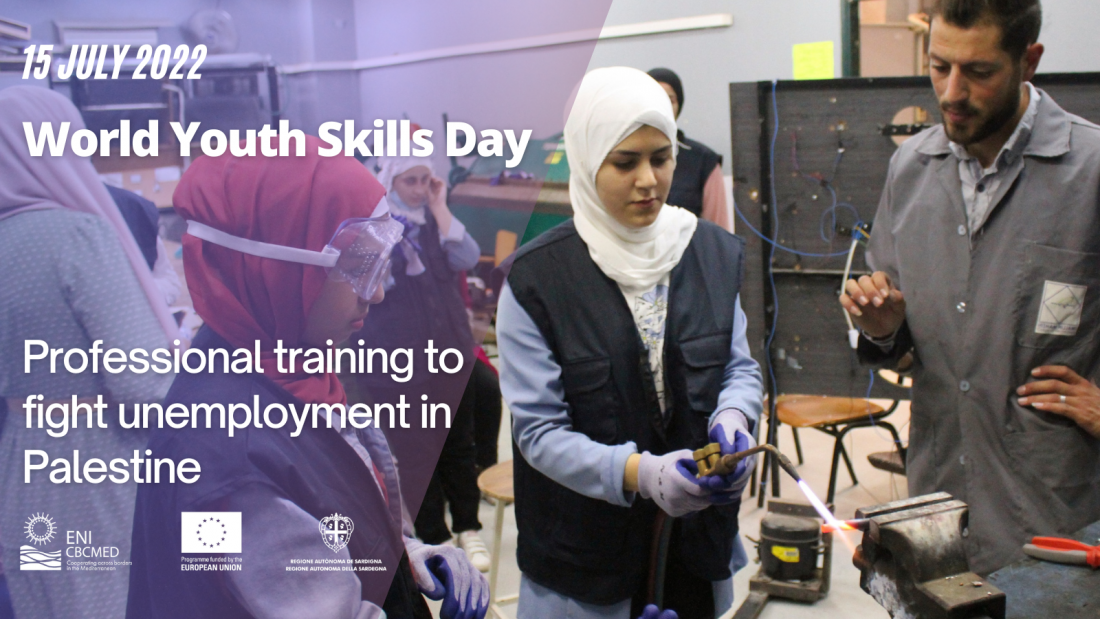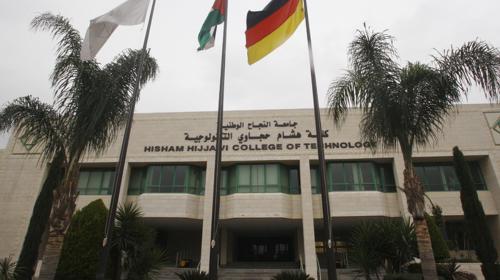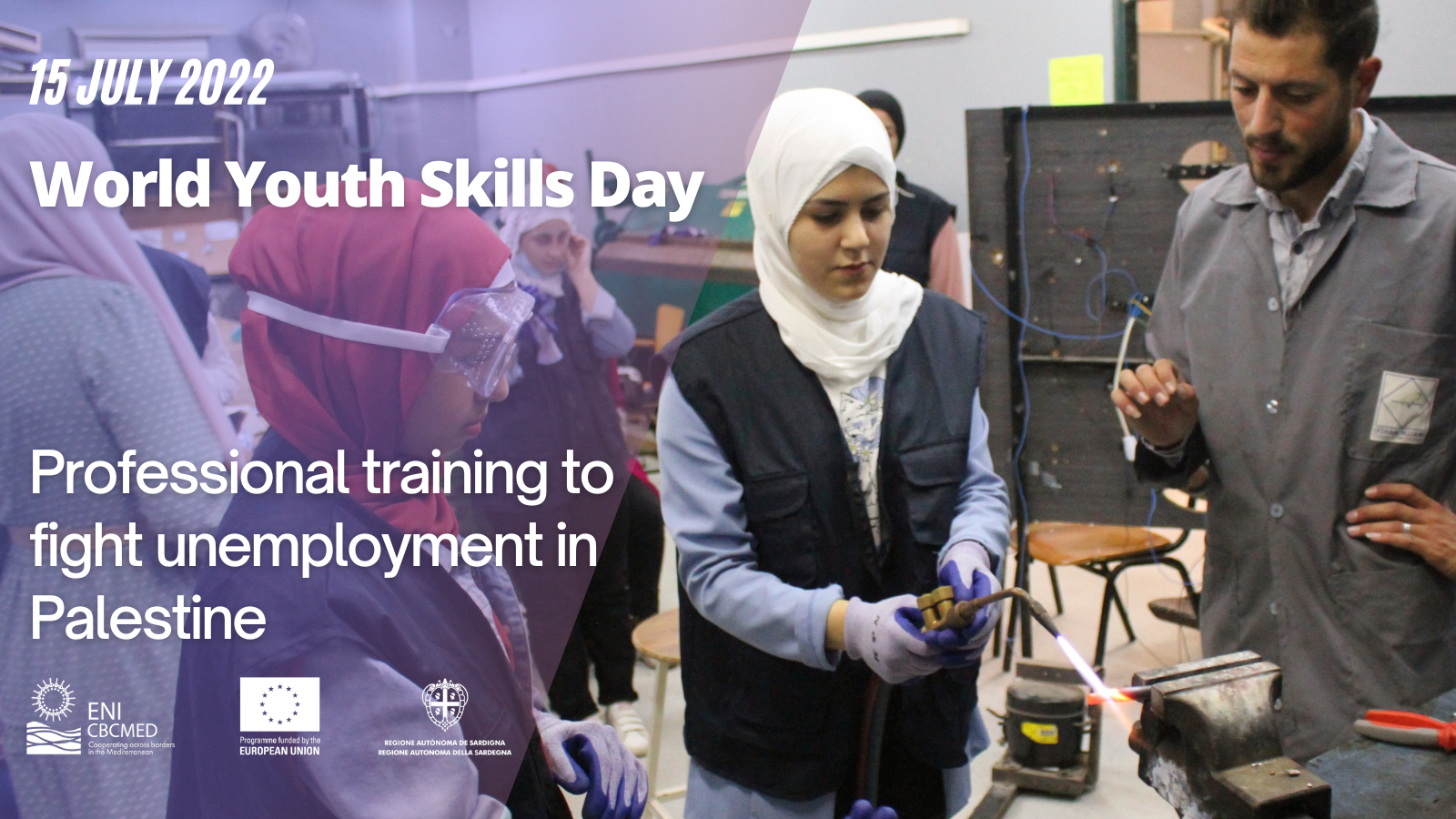World Youth Skills Day: discover what young Palestinians need to find a job

How to address labour market´s needs: a Palestinian success story
The story began about 20 years ago when some studies showed what the labour market really needed more technicians and skills directly applicable in technological and industrial sectors. With an investment of 30 million euros thanks to the German development bank, KFW, the Hisham Hijjawi College of Technology was born in Nablus. Today, 100 people work there and train about 1 200 students from all the surrounding governorates of the north part of the West Bank: the governorates of Jenin, Tulkarem, Qalqilya, Salfit, Tubas and of course Nablus.
The college offers 22 training programmes that cover a wide range of specialities: from administration and accounting to beautician and car mechanics. They even offer a training to become a land surveyor. For instance, the West Bank is divided into 3 areas: A, B and C. Area A is exclusively administered by the Palestinian National Authority; Area B is administered by both the Palestinian Authority and Israel; and Area C, which contains the Israeli settlements, is administered by Israel. Some lands in area C are not registered and in order to do so, you need land surveyors. This is a clear example of how a training emerged from a labour market need.

Insight of a Technical and Vocational Education and Training in the West Bank
A Technical and Vocational Education and Training (TVET), a term which appeared about 20 years ago too, is any form of education or training that provides knowledge and skills related to different economic sectors. It focuses much more on the practical side rather than the theoretical one. We could say that in a way it is the other side of education compared to universities studies.
Let´s discover how the Hisham Hijjawi College of Technology works. First of all, it is purposely located in the east part of Nablus, close to the industrial area, to better respond to the needs of the companies and workshops located there with skilled young people who can immediately join them. The main objective of the college is to reach zero unemployment. And so far, it seems quite a success as all the students find a job right after completing their training. Having trainers who are employers helps a lot. And although the college is not an employment agency, the staff facilitate the contacts between Palestinian private companies and their students.
The college offers three types of degrees. The first one is the technical level certified by the ministry of education. The second one provides professional certificate or the so called semi-skilled: it is a one-year training and is certified by the ministry of labour. The third one can be either through short (3-6 months) and long training cycles (6 -12 months) which are certified by academies. There are no requirements of completing primary or secondary schools in the last case.
The green economy: a new sector emerging in Palestine
The Hisham Hijjawi College of Technology is the Palestinian partner of GREENLAND, an ENI CBC MED funded project. It aims at providing green skills to young people who are Not in Employment, Education or Training, the so called NEETs. While the college is used to assess the required skills required by the labour market, it is the first time that it conducted a study analysis focused on green skills in the framework of this project. In Palestine, most people who have heard of the green economy associate it to agriculture and not necessary to renewable energies, hybrid or electric cars. Besides gathering detailed data to identify green economy sectors with potential of recruitment, the college has the ability to negotiate with companies to offer the best option in order to respond to the needs.
From engineer to technician: a solution to better address youth unemployment in Palestine
In Palestine, most families wish to see their daughters and sons become engineers, medical doctors and lawyers. It is part of the social and cultural prestige, and it is not easy to change this mindset. However, the reality of today makes people start seeing the future in a different way. When we know that about 50% of universities students are still unemployed more than a year after graduating while students freshly graduated from a TVET immediately find a stable job, then the whole society start changing its mind about technicians and other professional jobs.
This is one of the aspect the college is working on through raising awareness about the potential of professional careers through TVET trainings. In other words, what they call career change. During the last years, the staff at the college has noticed a slow but tangible change. More and more universities graduates start thinking of this career change as a real opportunity to be able to move on in their lives. Some of them even admit that a 6-month training in a TVET is much more effective than a full university degree that takes about 5 years to complete.
“Some young Palestinian even admit that a 6-month training in a TVET is much more effective than a full university degree that takes about 5 years to complete.”
The future of the Palestinian economy relies on women
Many Palestinian men are highly attracted by the salaries that Israel companies offer, 2 to 3 times the average Palestinian salary. This is a real threat to the Palestinian economy. While men are attracted by this economic advantage despite the physical barriers of reaching the workplace, Palestinian women tend to prioritize other aspects in their lives such as their families and children. In this sense, the college also encourage women to take part in TVET trainings as they are going to work for Palestinian companies and not in Israel. To do so, the college staff also meet with the student´s parents to convince them of the advantages that their daughters can get by following such trainings.
The last few years, the college has increased the number of women enrolled in TVET degrees and who benefitted from international grants. Those women have proven to be smart, efficient, and even more capable than male engineers when dealing with practical aspects such as the installation of photovoltaics panels.
Lack of equipment, space and human resources
While the college witnesses more interest from university students and women, it faces challenges in order to keep up with the broader regional labour market which also includes the Gulf countries. They lack investment to develop new curricula, resources to train professionals abroad to the latest techniques and even lack of space to enlarge some workshops such as carpentry. With the covid-19 pandemic, as a TVET centre, the college adjusted as much as it could to limit the prejudice to the students, working longer hours per day and even on weekends to make sure each student gets the practical part. As most of the trainings represent about 30 % of theory and 70 % of practice, it is clearly much more costly to train students in TVET programmes than in universities. Knowing the reality of the Palestinian economy, the college can hardly rise the fees too.
Last message: creativity is the key
When asking Mr. Darwish about what message he would like to share with young Palestinians, he focused on the creativity part. He has been abroad and saw many examples of young entrepreneurs and still he believes that despite all the difficulties young Palestinian are facing, they have proven to be pioneers in some sectors, they have creative ideas that can be turned into successful businesses.
Creativity may be a key to success but for that you also need solid skills and institutional support to be able to thrive.








